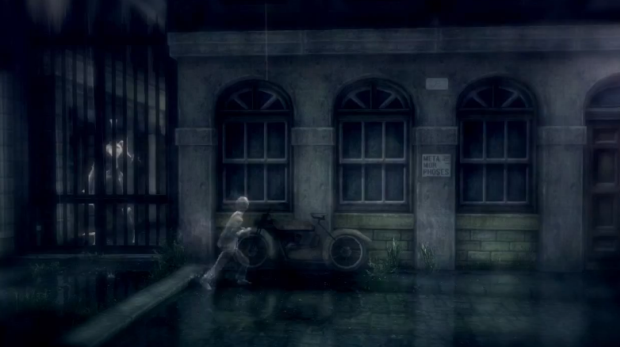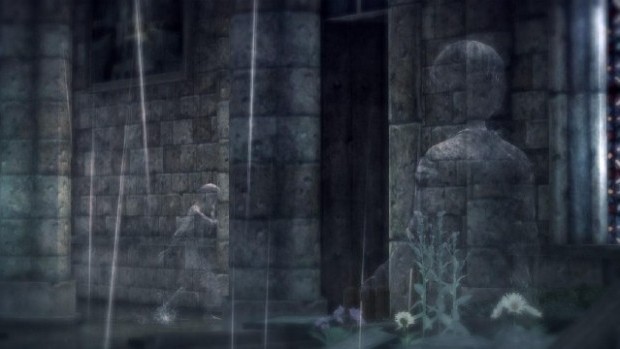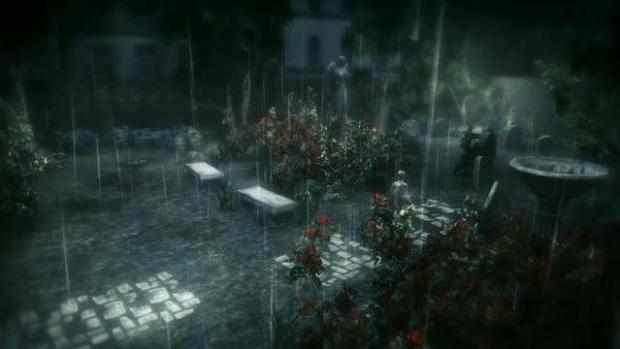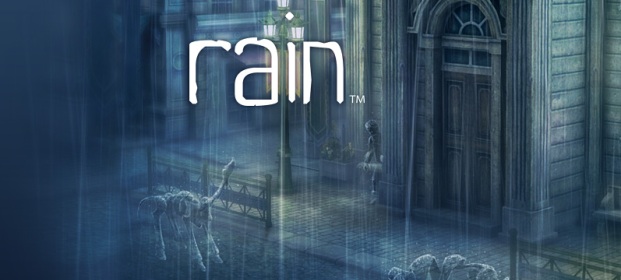The pitter-patter of water falling from the sky and hitting the cold, hard ground is something that a lot of us find comforting. Maybe it’s the fact that we’re indoors and there’s a blazing red fire keeping us warm whilst the soothing, almost rhythmic beat is a reminder that the horrors outside can’t touch us. Even though the utterance of the word normally brings about frowns among the majority of people, Rain is the perfect subject for Sony Computer Entertainment’s latest painting in the art gallery that is PlayStation Network.
Over the years, many delightful, out-of-the-ordinary titles have been regularly showing up on Sony’s digital distribution service and it now has a name of being somewhat of an exhibition in emotion. Whilst this attempt to convey a moving tale isn’t quite as on-point as some classics from this generation, and is in fact flawed in many ways, Rain is still an example of how the medium’s variance benefits players of a different disposition.

Rising from his slumber, a young boy looks out of his window to see a girl of a similar age being chased down the street by a frighteningly overbearing creature. After following them, the young lad discovers he has become invisible – and thus, SCE Japan’s puzzle-platformer begins. As this mute, unnamed infant, you must travel down back-alleys and up cramped avenues that resemble an old, Continental European town, in order to find the young girl. Subsequently, your eyes (and those of your foes) are the most important factors of the game, as Rain is as much about staying out of sight as it is about jumping across modest ravines.
While the pint-sized hero is getting drenched by the constant downpour, his form is shown via a glowing silhouette, and when under a building’s awning or one of the many archways scattered throughout the world, the only indication of his whereabouts are his small footprints that leave a wet trail behind him. This isn’t restricted to adolescents, though, as all living beings in Rain are only visible when out in the never-ending showers. The issue is that this can also become the crutch of proceedings. In long stretches of covering (such as the indoor environments), the player’s damp footprints dry up and simply leave a dust cloud at every step and, when this occurs, figuring out exactly where you are is more difficult than you want it to be. However, it must be said that when the idea works, it’s terrific. Jumping in a puddle to get the attention of a prowling beast in order to run under a covered alleyway to clear a previously guarded path is really satisfying.

As you progress, the idea isn’t furthered past the inclusion of muddy puddles. After stepping in a dirt-filled pool of water, the lower-half of your body will be seen when in-doors, but that’s where SCE Japan effectively stop. Rain features its most interesting attractions in the very early stages, leaving the notion of discovery behind. It’s a real shame, because there are definitely points of intrigue at the very beginning, but that soon halts when you realise it doesn’t go any further.
The biggest achievement here is in the fixed camera, something of an antiquated idea. Since games like Silent Hill and Metal Gear Solid ditched the system, its relevance has kept on dwindling, only to pop up on very rare occasions. Rain has a silent movie vibe that works very well with the overall presentation, with a soundtrack driven by piano and stylishly placed text on-screen. The static camera doesn’t feel out of place, nor is it a hindrance to gameplay, and the cinematography always points you in the right direction via sweeping shots and carefully angled frames. It’s a genuinely delightful aspect of Rain that gives this simple story some more dynamism.
Not that there is anything wrong with an easily digestible, harmless plotline – because there definitely isn’t. But it feels like the developers working on this Sony exclusive were aiming to draw on a diverse range of player emotions, yet it never quite happens. The number of artistically inclined titles on PlayStation Network is growing with every passing year and Rain’s telegraphed scenes mean that it doesn’t stack up against other, more effective games. One aspect of this disappointing tale that does drive everything forward is the almost-indestructible antagonist, The Unknown.

The Unknown is a constant force within Rain that is Terminator-like in its insistence to hunt prey, which in this case is the children of Rain. The reasoning behind its attacks is not made clear, but its menacing demeanour is certainly enough to make you feel uneasy. Like the other adversaries in search of the young boy and girl, The Unknown cannot be hurt by the player in a traditional sense, and must therefore be either outran or outsmarted through simple puzzles. On one occasion, in order to pass the perilous pursuer, the young boy must sneak around The Unknown and begin to play a gramophone, before using a conveniently placed doll to distract the indefinable brute.
Now, the ambiguous nature of Rain’s nemesis isn’t a rarity, as most enemies look like something of a mish-mash of polygons and generally have movements that are awkward and stiff. The models are atrocious and the dingy surroundings aren’t much better. Of course, with the water falling from the heavens at a considerable rate, the world isn’t going to be full of colour and vibrancy, but the setting is, like the story, lacking any true character, and fails to capture any child-like imagination.

Rain isn’t a long game, like so many of its counterparts in the “artsy” department, and that’s perfectly fine. Some will be perturbed with its length, but it’s really not an issue whatsoever. The hint system really quickens the process, but to its detriment, as the puzzles aren’t too difficult and will rarely have you scratching your head in confusion. During play, a prompt will appear on-screen to hit the select button for a tip on how to solve the already very solvable challenges. Rather than give you a simple clue, these hints basically tell you, in a very ham-fisted way, exactly what to do. It’s the antithesis of subtle. One can be in the process of figuring out a simplistic trial when a reminder to press the select button will appear. In a relatively straightforward game where it’s clear the developer wants to immerse players in the story, this really doesn’t help.
VERDICT: In terms of console games, PlayStation Network offers a lot of diversity for those that want it and, on the surface at least, Rain is exactly that. Upon playing it, it shows itself as a competent, though uncomplicated, puzzle effort, with a decidedly average storytelling style. The invisibility mechanic is also a wonderful idea, yet flawed in execution. Rain has moments of greatness, particularly in the way it is framed, but overall, it drizzles to a close.

GOOD. A game that scores 7/10 is worthy of note, but unworthy of fanfare. It does many things well, but only a few of them incredibly well and, despite a handful of good qualities, fresh ideas and solid mechanics, it fails to overwhelm.






